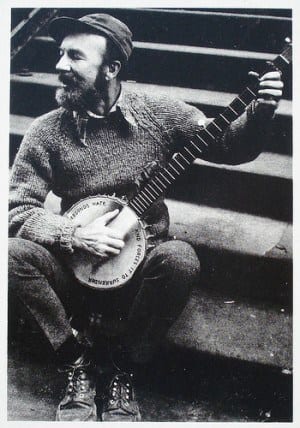
The man who touched millions of lives with his music and social activism
Pete Seeger, America’s last folk troubadour passed away on Tuesday surrounded by his family. He was 94 years old.
Seeger is best known as the folk icon that helped define the genre dating back to the 1930’s. Together with Woody Guthrie, the two shaped American roots music. Seeger wrote and sang mostly folk ballads about social change, the working class and spirituals.
He was known for popularizing the five-string banjo, as well as the 12-string acoustic guitar. He traveled the country throughout the depression playing songs to anyone who would listen. He sang simple songs that caught on quickly with the working poor.
After a stint as a touring musician in the Army during World War II, Seeger was blacklisted during the 1950’s for his communist views. He was banned from television and radio. He instead turned to college campuses where his brand of social activism meshed with the up and coming generation of young baby boomers.
His biggest hits included “Goodnight, Irene”, “If I Had a Hammer” and “Turn, Turn, Turn.” He is also famous for his interpretation of the old spiritual “We Shall Overcome,” which became the anthem for the Civil Rights Movement in the 1960’s.
He was a hero to artists who would go on to be much more successful than himself, including Bob Dylan, Bruce Springsteen and the Byrds.
Still playing until the day he died, Seeger was a champion of conservation. He made it his goal to clean up the Hudson River in his home state of New York. In 2008 he played at President Obama’s inauguration alongside Springsteen.
Even after his brand of traditional folk music fell out of favor, his reach spanned beyond just the music. Dave Matthews stated that “he made me want to be a better person.” He helped legitimize the music festival scene across America and was able to infuse music with a purpose.
Pete Seeger died in the hospital with his family by his bed singing songs.


















